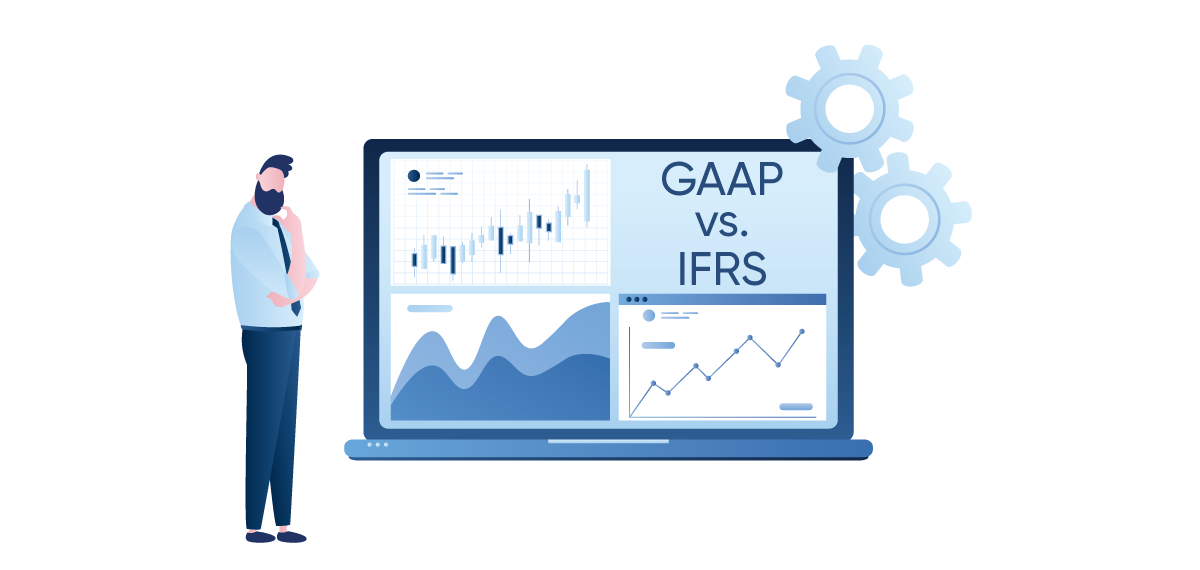GAAP vs. IFRS: Understanding the Differences and Choosing the Right Accounting Standards
Navigating the world of financial reporting and accounting standards can be a complex task for businesses and organizations around the globe. Two primary sets of accounting standards, Generally Accepted Accounting Principles (GAAP) and International Financial Reporting Standards (IFRS), dominate the field. Each system has its own principles and guidelines, and choosing between them can significantly impact financial reporting, compliance, and global business operations.
GAAP and IFRS: An Overview
GAAP (Generally Accepted Accounting Principles): These are the accounting standards used primarily in the United States. GAAP is a rule-based system, which means it provides specific guidelines and rules for different accounting transactions. These principles are developed and maintained by various standard-setting bodies, with the Financial Accounting Standards Board (FASB) being the primary authority.
IFRS (International Financial Reporting Standards): IFRS is a principles-based accounting framework used by most countries outside the United States. It’s developed and maintained by the International Accounting Standards Board (IASB). IFRS focuses on providing principles and concepts, allowing for greater flexibility and interpretation in financial reporting.
GAAP vs. IFRS: Key Differences
Approach to Rules
- GAAP: As mentioned, GAAP is rule-based. It provides specific, detailed guidelines for various accounting transactions, leaving less room for interpretation.
- IFRS: IFRS is principle-based, emphasizing the underlying principles and objectives of accounting rather than specific rules. This approach allows for more flexibility and adaptability in financial reporting.
Inventory Valuation
- GAAP: Under GAAP, inventory can be valued using either the First-In, First-Out (FIFO) or Last-In, First-Out (LIFO) method. LIFO is less common outside the U.S.
- IFRS: IFRS allows the use of FIFO, weighted average cost, and specific identification for inventory valuation. LIFO is not permitted.
Leases
- GAAP: GAAP previously distinguished between operating leases and capital leases. However, under the Financial Accounting Standards Board’s (FASB) ASC 842 standard, most leases are now treated as finance leases, bringing GAAP closer to IFRS in this regard.
- IFRS: IFRS has historically treated leases differently, with a focus on substance over form. This approach can result in different accounting treatments for certain leases.
Research and Development Costs
- GAAP: GAAP generally requires research and development costs to be expensed as incurred, with limited exceptions.
- IFRS: IFRS allows for the capitalization of research and development costs under specific conditions. This can lead to different financial reporting outcomes.
Income Statement Presentation
- GAAP: Under GAAP, there is no specific requirement for the income statement. Multiple formats are accepted.
- IFRS: IFRS prescribes a specific format for the income statement, including a minimum set of line items. This standardization can lead to more consistent reporting.
Which Should You Use?
The choice between GAAP and IFRS is not always straightforward and depends on numerous factors:
Location
If your business primarily operates within the United States, GAAP may be the preferred choice due to regulatory requirements and local norms. For companies with a global presence or aspirations, IFRS may be more appropriate.
Industry Considerations
Certain industries, such as financial services, have specific accounting standards and regulations that may influence your choice. Research your industry’s accounting practices to determine the most suitable framework.
Investor and Stakeholder Preferences
Consider the expectations and preferences of your investors and stakeholders. If they are more familiar with one set of standards, it may be advantageous to align your reporting accordingly.
Reporting Complexity
Evaluate the complexity of your financial reporting needs. GAAP’s rule-based approach can provide more detailed guidance, while IFRS offers greater flexibility but may require more judgment in application.
Regulatory and Compliance Requirements
Compliance with local regulatory authorities may dictate the use of GAAP or IFRS. Ensure you are aware of any specific requirements applicable to your jurisdiction.
Global Expansion Plans
If your business plans to expand internationally, using IFRS as your reporting framework can simplify financial reporting and promote consistency across regions.
The choice between GAAP and IFRS should be made based on careful consideration of your business’s specific circumstances and objectives. Seeking guidance from accounting professionals, such as NOW CFO consultants, and consulting with stakeholders can help you make an informed decision that aligns with your business’s needs and aspirations. Ultimately, the goal is to provide transparent and accurate financial information to support sound decision-making and build trust with investors and stakeholders.



